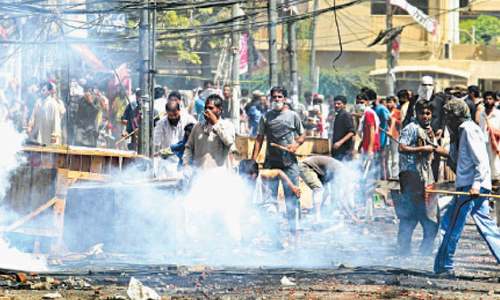LAHORE: Senior lawyer Syed Ali Zafar on Wednesday argued before a Lahore High Court larger bench that petitions against the second Joint Investigation Team (JIT) in the Model Town incident were not maintainable.
The seven-member bench headed by Chief Justice Muhammad Ameer Bhatti was hearing petitions against the formation of a new JIT by the Punjab government to hold a fresh probe into the 2014 Model Town incident.
Justice Malik Shahzad Ahmad Khan, Justice Aalia Neelum, Justice Syed Shahbaz Ali Rizvi, Justice Sardar Ahmad Naeem, Justice Sardar Muhammad Sarfraz Dogar and Justice Tariq Saleem Sheikh are other members of the bench.
Barrister Zafar resumed his arguments on behalf of Bisma Amjad, whose mother was killed in the tragedy.
Argues first JIT was biased and none of the eyewitnesses could appear before it due to fear
The lawyer said the Model Town incident could be equated with some of the worst massacres in world history such as the Jallianwala Bagh massacre in 1919, when the British forces opened fire on peaceful protesters. He said as in the Jallianwala Bagh massacre, the accused was the state.
In this case, he said, the sitting chief minister, his law minister and the police officers working under them were accused.
Justice Khan observed that the country also witnessed horrific incidents in May 2007 (Karachi riots when then ruler Gen Pervez Musharraf desired that deposed chief justice Iftikhar Chaudhry not enter the city) and in April 2021 (when police clashed with workers of proscribed Tehreeki-Labbaik Pakistan (TLP).
The judge noted that the TLP also claimed that at least 26 of its workers were killed in the incident.
The counsel further argued that instead of registering the case on behalf of the innocent public members who were killed, the then government filed an FIR against the very victims and started arresting them.
He said it was only after the intervention of the court that a counter FIR against the sitting government was registered.
He said the first JIT formed to investigate the matter was biased and none of the eyewitnesses could appear before it due to the fear that they would be arrested, tortured, and forced to change their statements.
He pointed out that when the ‘biased’ JIT gave its report, two of the ‘independent’ members belonging to MI and ISI dissented, stating that they had not been provided with the information and that the investigation was an eyewash.
He submitted that one of the victims namely Jawad Hamid was forced to file a private complaint which was still pending with an anti-terrorism court.
Barrister Zafar contended that it was only after the 2018 election when a ‘neutral’ government came into power his client Ms Amjad filed a petition with the Supreme Court (SC) in which the court first constituted a larger bench to examine the question of whether a fresh JIT could be constituted in the circumstances of the case and then when the Punjab government agreed to form the new JIT.
Justice Khan asked the counsel whether the SC touched the merits of the case as the court had not passed a direct order to form the JIT but disposed of the matter in light of the government’s statement.
Barrister Zafar said the SC accepted the petition and disposed it of with the orders that the same had “borne fruit”.
He argued that the persons responsible for the Model Town massacre had now come before the court and wanted the court to pass a judgement stopping the impartial investigation to proceed further which was contrary to the concept of fair trial.
He said the judgement of the SC deciding that the JIT had become final and binding and therefore the LHC had no jurisdiction to sit in appeal on the order passed by the apex court. He argued that the investigation therefore could not be stopped.
The bench would resume its hearing on Thursday (today) with remaining arguments of Mr Zafar.
Published in Dawn, October 21st, 2021














































Dear visitor, the comments section is undergoing an overhaul and will return soon.